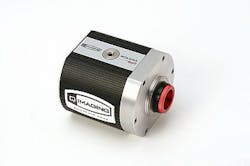sCMOS camera from QImaging provides 30-frame/s simultaneous readout
The Rolera Bolt scientific CMOS (sCMOS) camera is designed for low-light imaging, especially biomedical imaging in live-cell and whole organism studies at video frame rates. It has a high-quantum-efficiency 1.3-Mpixel sensor, read noise ~3e-, and 30-frame/s simultaneous readout. Pixel Freeze technology renders dark current nearly undetectable, so Peltier cooling is unnecessary. The camera employs a USB 2.0 interface.
QImaging
Surrey, BC, Canada
-- Posted by Vision Systems Design
---
NEW PRODUCT PRESS RELEASE
QIMAGING INTRODUCES THE RoleraT BOLT SCIENTIFIC CMOS camera for HIGH-SPEED FLUORESCENCE Imaging
With Minimal Investment, Scientific CMOS Imaging Technology is Now Available to Every Research Lab
SURREY, BC - QImaging announces the release of the Rolera Bolt Scientific CMOS camera, a high-speed imaging alternative that is less than half the cost of most scientific CMOS and CCD cameras. The Rolera Bolt is the latest addition to QImaging's high-speed, high-sensitivity family of cameras that also includes the recently released Rolera Thunder.
Designed for low-light imaging, the Rolera Bolt is especially suited for biomedical imaging as more research moves toward live-cell and whole organism studies at video frame rates. This includes motility studies where dynamic events (e.g. zebrafish heart contractions, C. elegans tracking, etc.) need to be captured with high spatial and temporal resolution in order to provide the maximum amount of information to the researcher.
The Rolera Bolt is also ideal for life science applications using fluorescent labeling, such as immunofluorescence, live-cell fluorescent imaging, ratiometric imaging, high speed calcium imaging, time-lapse fluoresence and fluoresence in situ hybridization (FISH). Additionally, the Rolera Bolt's aggressive price point makes scientific CMOS performance accessible to price-sensitive markets, including machine vision and industrial imaging.
The Rolera Bolt's technical features include a high quantum efficiency 1.3 mega-pixel sensor (3.63 µm x 3.63 µm pixel size) combined with low read noise (~3e-) and high-speed (30 fps full resolution) simultaneous readout. Using new Pixel-Freeze TechnologyT, dark current is reduced to nearly undetectable levels, eliminating the need for an expensive Peltier cooling system. This allows for a lightweight, compact design with minimal power requirements, enabling the Rolera Bolt to utilize a single USB 2.0 connection for both power and 12-bit data transfer.
Because of its smaller pixel size, the Rolera Bolt can be used with lower magnifications to achieve increased signal and field of view. A dynamic range of approximately 4500:1 allows the camera to quantitatively display dim and bright signals in a single image, a range comparable to standard CCD devices.
"Our goal is to provide researchers with an effective scientific CMOS camera that is easily obtainable, even when funding is scarce," said Chris Ryan, associate product manager of QImaging. "The Rolera Bolt enables more research facilities to easily invest and take full advantage of the performance that only scientific CMOS imaging provides."
Using the standard QCam API and QImaging Software Development Kit (SDK), the Rolera Bolt seamlessly integrates with high-end OEM systems and customized software applications. Standard with all QImaging cameras, the Rolera Bolt is backed by an industry-leading two-year limited warranty. Each camera meets the standards of QImaging's Product Quality Policy and is further backed by support technicians who are trained in specific applications and installation procedures.
About QImaging
QImaging designs and manufactures user-friendly CCD, EMCCD, CMOS and scientific CMOS cameras for life science, machine vision and OEM applications. These affordable and diverse digital imaging solutions offer outstanding versatility, ease of use and reliability. Customers around the world use QImaging cameras to perform quantitative image analysis and acquire high-resolution images for publication. The company offers a comprehensive OEM Camera Program and maintains numerous third-party alliances with software companies and system integrators to consistently deliver imaging solutions and application-specific software that supports a broad range of bioscience and industrial applications. QImaging is headquartered in Surrey, Canada, and is a registered ISO 9001:2008 company.
SOURCE: QImaging
